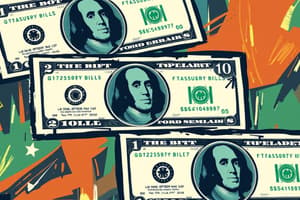Podcast
Questions and Answers
What is the primary characteristic of money markets?
What is the primary characteristic of money markets?
- Long-term investment duration
- High liquidity and low risk (correct)
- Investment in commodities
- Low liquidity
Which of the following denominations is most commonly associated with Treasury Bills?
Which of the following denominations is most commonly associated with Treasury Bills?
- $1,000
- $5,000
- $10,000 (correct)
- $100
What type of risk is associated with Treasury Bills?
What type of risk is associated with Treasury Bills?
- Default risk (correct)
- Market risk
- Interest rate risk
- Liquidity risk
What is the typical maturity range for Treasury Bills?
What is the typical maturity range for Treasury Bills?
What is the primary issuer of Certificates of Deposit (CDs)?
What is the primary issuer of Certificates of Deposit (CDs)?
What is the typical minimum denomination for marketable Certificates of Deposit?
What is the typical minimum denomination for marketable Certificates of Deposit?
What formula is used to calculate the Bank Discount Rate for Treasury Bills?
What formula is used to calculate the Bank Discount Rate for Treasury Bills?
Which of the following statements about the taxation of Treasury Bills is true?
Which of the following statements about the taxation of Treasury Bills is true?
What is the typical range of maturity for a Certificate of Deposit?
What is the typical range of maturity for a Certificate of Deposit?
How is interest typically paid on Treasury Bills?
How is interest typically paid on Treasury Bills?
Flashcards are hidden until you start studying
Study Notes
Money Market
- A subsector of the fixed-income market
- Short-term debt securities
- Highly liquid, meaning they can be easily bought and sold
- Low risk, meaning they are considered safe investments
- Often have large denominations, meaning they are typically sold in large amounts
Treasury Bills
- Issuer: Federal Government
- Denomination: Commonly 10,000;10,000; 10,000;1,000
- Maturity: 4, 13, 26 or 52 Weeks
- Liquidity: High
- Default Risk: None
- Interest Type: Discount (investors buy T-bills at a discount to face value and receive the full face value at maturity, the difference between the purchase price and the face value represents the interest earned)
- Taxation: Interest earned on T-bills is subject to federal income tax but exempt from state and local taxes.
Bank Discount Rate
- This is how T-bill yields are quoted
- Formula: rBD = ((10,000−P)/10,000 - P) / 10,000−P)/10,000) * (360/n) - rBD = bank discount rate - P = market price of the T-bill - n = number of days to maturity
- Example: A 90-day T-bill with a price of $9,875 would have a bank discount rate of 5.00%
Certificates of Deposit (CDs)
- Issuer: Depository institutions (like banks)
- Denomination: any, $100,000 or more marketable
- Maturity: Varies, typically 14-day minimum
- Liquidity: High for CDs that are marketable
Studying That Suits You
Use AI to generate personalized quizzes and flashcards to suit your learning preferences.




